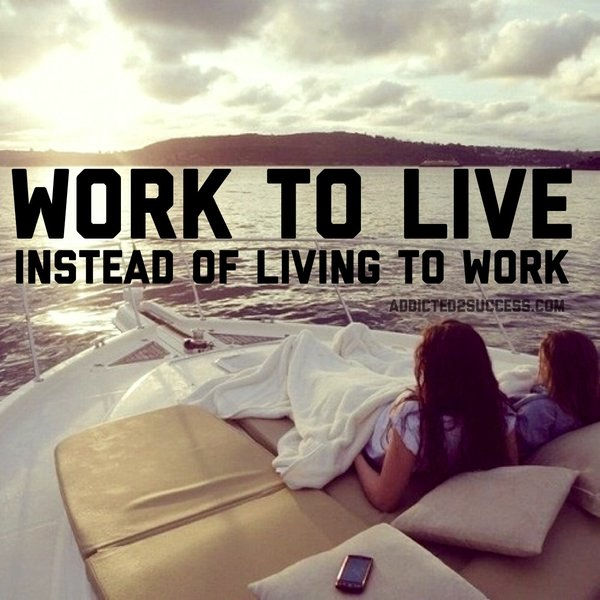Work to live and live to work
- Jun 2, 2017
- 4 min read

24X7, 365 days and nights, family time (whatever little is left), hobby time (what's that?), festival time (if there’s is no deadline), holidays time (only if the tuning with the boss is great)
We Indians work to live and live to work. Emails, meetings, deadlines, inflation, peer pressure,
family pressure, we have ample reasons to be virtually in our office, every moment of the day and the night (ie if you reach home on time) and ironically that is the only way we know.
Look around you, look within you, you will find ample examples everywhere, where each one of us, is working 24X7. Work is increasingly invading our personal lives, and we are often in work-mode even at off-duty hours. But why? Why is it that we have absolutely no time for ourselves, family, outings, hobbies, holidays or even relaxing? Why is the concepts of work –life balance still an alien concept to us? Why do we love to carry the workplace pressures or stress, as baggage, back home? We are probably the only country in the world that puts in 6 days a week and clocking a whopping 60+ hours a week is just normal and working on weekends and holidays is inevitable, unlike western countries, where people strictly adhere to the time and work.
We have recently moved to Singapore from India and went for a 3 day holiday. After 2 days I felt something amiss. My husband's phone didn't ring even once! It was a shocking phenomenon for me! But that's the way they work here. People respect your personal space and nobody disturbs you on your holiday. But do WE relax? No, my husband did not miss even a single mail!!!
What is it that drives us so? Is it our cultural baggage that drives us to be what we are? Is it he
aristocratic system that is still ingrained in our society as the Kings and rulers have ruled us for centuries and millennia? Is it the authoritarian corporate culture where leaving the office before the boss would mean negative appraisals? Is it the insecurity within us that knows that in the staggering work force available.
I can be replaced within a day? Is it the fear of post retirement and family demands that drives
us or the fact that in our country we cannot live off govt. grants and social security, or is it just the way we are? Historically, if we see, in the Vedic period, we identified so much with our professions that our most basic social and religious identification - the Varna system, was based on what ? The profession of the person!!
Our work was not just what we did, it was what we WERE! In Sanskrit, the word for duty and
religion is the same - Dharma. And that has been ingrained so deeply in our psyche that wok becomes our prime motive and we just don't feel the importance of spending time away from work. Another major reason that socialists attribute this to the fact that we are a Relationship based society and not a Contract based society, unlike the western nations, so we clock in overtime and don't even get paid for it!! Infact, Rattan Tata's s controversial comment sparked off a worldwide debate on this issue, where he pointed out that "No one was willing to go the extra mile in UK while In India, if you are in a crisis, if it means working to midnight, you would do it. But, like Narayana Murthy pointed out Does working longer hours means being effective?
Shouldn't the output matter in the long run?
For us Indians, workplace is an opportunity to build our future and we put forth extensive efforts to climb the corporate ladder. But, is working day and night, beyond limits and losing work-life balance, the right way to achieve this? How can someone be good at their job, in
the long run, if they never relax and never take leave? Why is it that we can only garner our sense of pride and satisfaction from the work that we do? Why is our social standing just known by the rung of corporate ladder that we have reached? And why is it that the family
and me time the last on our priority list?
Infact the biggest bane between me and my husband has been to make him develop a hobby! Why is it so far-fetched for us to take an interest in something that has nothing to do with work? It could be learning a foreign language, amateur theatre, photography, gardening, script-
writing, learning about the stock market, whatever! In western countries evening classes are packed with people doing such things and when they meet you they want to know what else do you do beyond work? Working too hard is possibly something that a lot of us are guilty of. But is work truly fulfilling us, and at what cost? When will we learn that work is a part of our life, but not the life itself? When will we stop committing karoshi , as the Japanese say, ie. death by overwork?
Perhaps it is time we learnt to negotiate a good work-life balance. Our cultural heritage conditions us to focus on tomorrow. But balancing this with living in the moment
can add more to our health and happiness. It s a choice. We can either fight through this life with just deadlines and targets, or love this life through meaningful job satisfaction and personal milestones, where quality time with family, restful weekends, holidays, hobbies, all need to become more of a priority. Remember, the graveyards, they say, are filled with people who thought thing s could not go on without
them





















Comments